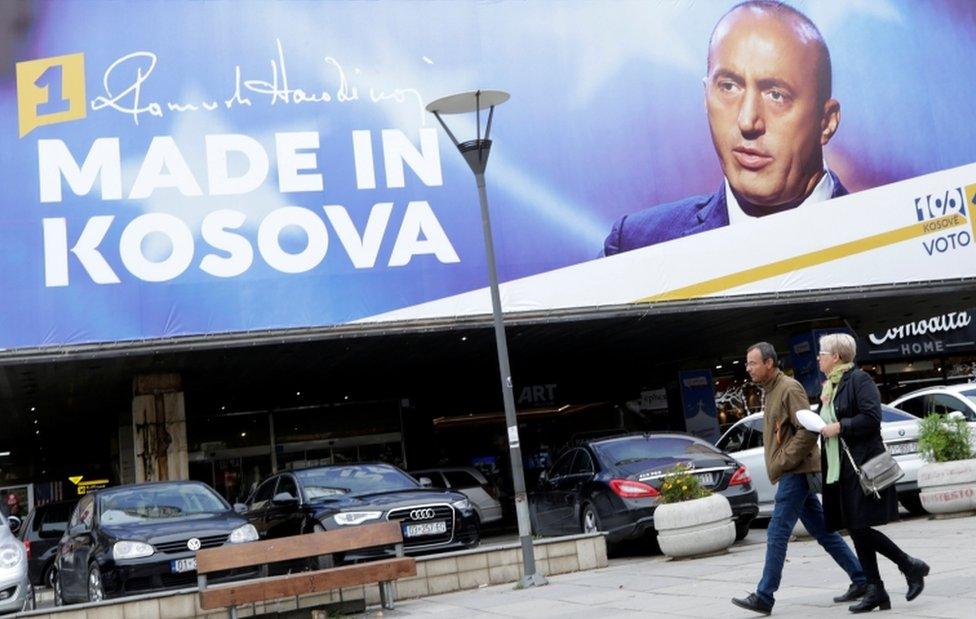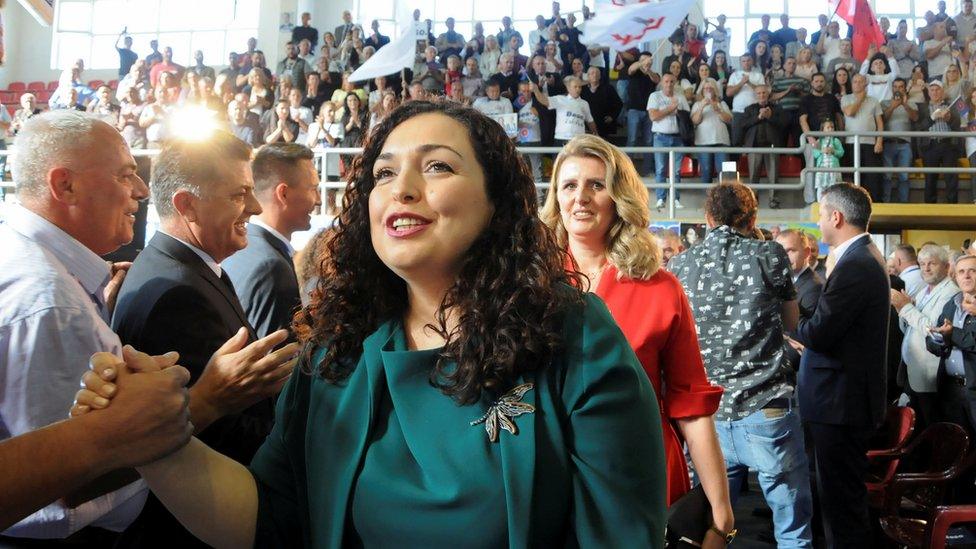Kosovo election: War crimes claims against PM hang over vote
- Published

Ramush Haradinaj resigned during the summer when he was named as a suspect by a special court in The Hague
Eleven years after Kosovo declared independence, the past role of Prime Minister Ramush Haradinaj as a guerrilla fighter against Serbia overshadows Sunday's snap election.
Mr Haradinaj sparked a trade war with Serbia, even though Kosovo and its neighbour are barred from entering the EU until relations are normalised.
Kosovo President Hashim Thaci is also a former rebel who fought Serb forces.
But opposition parties are hoping to force them from power.
Kosovan Albanians make up about 90% of the population, and tensions remain with the Serb minority.
Why are war crimes an election issue?
In June, Prime Minister Haradinaj announced that he was resigning to face questioning as a suspect by a new special court in The Hague.
The conflict in Europe that won't go away: Three BBC correspondents explain the Kosovo war two decades on
It is investigating war crimes allegedly committed by the Kosovo Liberation Army during the late 1990s.
Mr Haradinaj was a commander in the KLA and has already faced trial twice by a previous tribunal in The Hague. He was acquitted both times.
Why is Mr Haradinaj standing?
The special court has yet to announce any indictments - and will not even reveal the identity of suspects. So Mr Haradinaj and his AAK party are free to take part in the election.
In fact, his visit to The Hague may even prove a vote-winner.

Vjosa Osmani, the leader of Kosovo's oldest party, is hoping to become its first female prime minister
"The fact that he has been called before the tribunal is seen by many Kosovo Albanians as a deep injustice," says James Ker-Lindsay, a Balkans specialist at the London School of Economics.
"This is seen as calling into question Kosovo's right to exist. People believe that what the leaders were doing during the war was legitimate. They were fighting a campaign against Serbian oppression and should not be held accountable for this - and Haradinaj was a hero of this conflict."
Why is there a trade war with Serbia?
Mr Haradinaj imposed a 100% tariff on imports from Serbia last November, in retaliation for Belgrade blocking Kosovo's membership of international organisations. It has been a popular policy, even though it has increased the prices of many items in Kosovo's shops.
Many people view it as standing up to Serbia, which has refused to recognise Kosovo's 2008 unilateral declaration of independence. Scores of other countries will not recognise Kosovo until Serbia changes its stance, leaving Kosovo in limbo.
In fact, Serbia has been stepping up efforts to persuade countries to withdraw their recognition of Kosovo's independence. It claims that 15 countries have reversed their previous position.
In practical terms this makes little difference to Kosovo's status. As long as China and Russia do not recognise its legitimacy, it has no chance of joining the United Nations and many other international institutions.
Albanians and Serbs remain divided after the war
But reducing recognitions among UN member states below 50% would be a propaganda blow. Kosovo says it is recognised by 116 of the UN's 193 countries, but Serbia says the figure is 97.
Mr Haradinaj hopes the tariffs on Serbia will force the issue.
"The way out of where we are is a comprehensive agreement on recognition between Serbia and Kosovo," he told me.
"That would resolve not only the tariffs, but every other dispute between two nations that are neighbours. We are ready to stand up for ourselves forever - we have no alternative."
So is Mr Haradinaj's party the favourite?
Not at all. For many voters, modern-day concerns trump past glories.
"People are deeply aggrieved at the way Kosovo's society has evolved," says James Ker-Lindsay.
"They believe corruption is rampant - and there are severe questions about the state of the economy. And they don't feel the existing political parties have been dealing with that."
That could drive voters towards Vetevendosje - an Albanian nationalist movement with a strong anti-corruption message - or Kosovo's oldest party, the LDK. Its leader Vjosa Osmani is hoping to become Kosovo's first female prime minister.
Could a new government steer Kosovo towards EU membership?
The tariffs have torpedoed one of the EU's main foreign policy initiatives - normalisation talks between Belgrade and Pristina.
Kosovo has repeatedly ignored pleas from Brussels to revoke the 100% tariffs on Serbian imports - a stance that harms its chances of gaining visa-free travel to the EU, never mind EU membership talks.
When a new government emerges from post-election coalition negotiations, rebuilding relations with Brussels must be near the top of its agenda.
- Published24 March 2019
